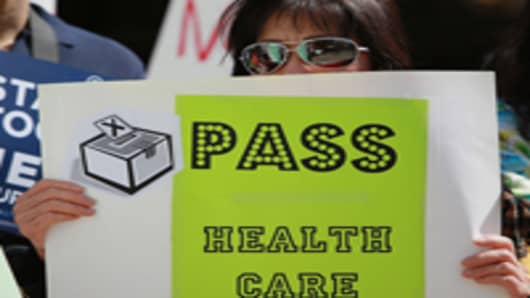According to an Urban Institute study, just 3 percent of the 269 million Americans younger than 65 -- about 7.3 million uninsured Americans -- will be required to purchase coverage on their own or pay a penalty (also being called a fine, tax or assessment) to help offset the costs of caring for those without health insurance.
The Urban Institute says that as for the rest of the sub-65 population:
Nearly 6 out of 10 are currently insured and are expected to remain that way. One-third is exempt from the mandate primarily due to modest incomes.
Three percent are eligible for free or nearly free coverage under Medicaid or the Children's Health Insurance Program, or CHIP.
Four percent will be eligible for tax credits that will lower their premiums through the new state health exchanges.
Exemptions and special considerations could spare 40 percent of uninsured Americans from the mandate, according to models prepared for the Kaiser Family Foundation by Jonathan Gruber, an economics professor known as "Mr. Mandate" at the Massachusetts Institute of Technology.
"There are a range of exemptions," says Kathleen Stoll, director of health policy for the health-care consumer group Families USA. Among them: those who reside outside the country, members of Native American tribes, people who are incarcerated, and those who qualify for a waiver based on religious grounds or special conditions.
In Massachusetts, where the prototype for the Affordable Care Act has been in effect since 2007, Gruber estimates that 1 percent of taxpayers paid a penalty in 2009.
What will the mandate cost?
Those still exposed to the health-care reform mandate who fail to obtain health insurance by 2014 will face a penalty from the Treasury Department on their federal tax returns. They'll be charged either a percentage of their income or a straight dollar amount, whichever is greater.
In 2014, the penalty will be either 1 percent of household income or $95 for an uninsured adult and $47.50 per child, up to a family cap of $285. In 2015, it jumps to 2 percent of household income or $325 per adult and $162.50 per child, up to family cap of $975. In 2016, the hit increases to 2.5 percent of household income or $695 per adult and $347.50 per child, up to a family cap of $2,085.
Beginning in 2017, the penalties increase annually based on the cost of living, but they cannot exceed the national average premiums charged for the minimum or "bronze" level health insurance offered by the coming state health exchanges, where consumers will be able to comparison shop for health plans.
Under the health-care reform law, Americans with incomes below 133 percent of the federal poverty level will be covered under Medicaid. Uninsured Americans whose incomes range between 133 percent and 400 percent of the poverty level (which currently means incomes of $14,856 to $44,680 for individuals, $30,656 to $92,200 for a family of four) will be eligible for federal subsidies to buy insurance through the exchanges.
Should you just pay the penalty?
For those who are dead set against complying with the individual mandate and buying health insurance, does it make financial sense to simply pay the fine?
"The question is, do you want to spend the money for nothing, or do you want to spend the money and have something?" asks the Urban Institute's Feder. "For most of the uninsured, it's a question of affordability. We are making it so much more affordable that one would think everyone would buy."
Sandy Ageloff, a health and group benefits leader for the human resources consulting firm Towers Watson, says prices on the health care reform exchanges may be so affordable that the plans will attract consumers who are now covered by employer health insurance.
"They will have the opportunity in the exchange to get both reduced cost of premiums and also enhanced benefits -- lower deductibles, lower co-payments and higher reimbursements -- depending on their income," Ageloff says. "There's nothing binding them to employer coverage in the way it often does today. So for some employees, it may be a more financially advantageous choice than their employer's plan."


